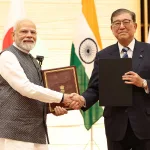FRAGRANCE OF IDEAS
The terror carnage in Pahalgam on 22 April 2025 by the terrorists, sponsored and supported by Pakistan, consequently led all of us to the ‘Operation Sindoor’ launched by the Indian nation-state. The three-day Phase-I of this operation that was ignited on the ground and air on 7th May, 2025 came to a temporary stop due to Pakistan’s insistence that the military aggression by the two nations should come to a halt.
In this context, the Director General Military Operations (DGMO) of Pakistan contacted his counterpart in India on 10 May 2025 and expressed his request to pull up the operation. The DGMO of India, under instructions from above, agreed to the same with the condition that the two DGsMO would meet again on 12 May 2025 at 12.00 noon to discuss further details. However, India made it clear that the Operation Sindoor was suspended only for the time being.
During the operation launched on 7th May, all the three wings of the Defence forces of India under the overall unified command and control of the Prime Minister Narendra Modi attacked the terrorist camps in PoJK and Pakistan. In total, nine targets were completely destroyed across Pakistan and PoJK.
The Defence spokesperson of India clarified that the initial goals under Operation Sindoor were successfully achieved and more than 100 designated terrorists were killed on the spot. The proofs in regard to the success of the Operation were provided by Pakistan itself, some overtly and some covertly.
Pakistan has been consistently saying that the state of Pakistan was/is itself a ‘victim of terror’ and that it had been fighting the menace of terror along with the rest of the world for a long time. If that would have been true then Pakistan should have been thankful to India for what it did on 7 May 2025. It did what Pakistan was supposed to do long ago but refused to act in accordance with its commitments made to the international community including India from time to time.
Instead, Pakistan gave an ‘official farewell’ to the dead bodies of the terrorists slain in the Operation Sindoor at various places in Pakistan. The Pakistan flag was put on their coffins; and the government officials as well as the senior military officers were seen attending their funeral -live by the world. This proximity of the state with the terror machinery in Pakistan stands fully exposed and thus also exposes Pakistan’s so-called narrative about it being the ‘victim of terror’.
The heavy retaliation by Pakistan to the Operation Sindoor on 8 & 9 May 2025 was responded to by the Indian Defence forces with the might and wit which Pakistan couldn’t match at all and failed even to secure its military and strategic installations. Their offence and defence capabilities were miserably challenged by India’s high technical and military defence and offence system.
Though Pakistan used Chinese, US and Turkish defence equipment against India from J&K UT to the state of Gujarat, it failed to penetrate the Air Defence System of India called S-400 and was destroyed midway in the air. The S-400 as a system has been integrated by the defence and scientific experts of India with the legendary and modern weaponry system. There was more than 95% record success rate throughout India in this regard and it was a huge success in favour of our defence preparedness.
In the field of offensive launch programme of our defence forces, India successfully targeted 11 airbases of Pakistan from Skardu in the extreme north in PoJK to the deep South in the Punjab province of Pakistan. In addition to this, Rawalpindi stadium, near the military headquarters of Pakistan was also destroyed. The air bases included Nur Khan (Chakala), Rafiqui, Murid, Sukkur, Sialkot, Pasrur, Chunian, Sargodha, Skardu, Bholari and Jacobabad.
These sites were chosen by Indian defence forces for their operational importance, including drone warfare command centres, air defense nodes and aircraft deployment hubs. Besides all this, 4 radar stations of Pakistan were also targeted and destroyed by India’s air defence system. Destruction at Nur Khan airbase, Sargodha and Murid are very heavy losses for Pakistan that hit it below the belt and crippled its normal and critical defence capability.
The issue pertaining to Brahmos missile attack by India on the hills near the nuclear capability assets of Pakistan and the consequent tremors in the adjoining areas has caused serious debate at the national and international level. The emergency import of material to contain radiation effects by Pakistan from Egypt is also being discussed.
The debate also comprises the worries and concerns of Europe, US and China in this regard. The US’s extraordinary interest in the Indo-Pak current tussle has also its input from the satellite images and scanning of the defence and the related activities in the region and it has put it on high alert.
India’s defence, scientific, strategic and geo-political superiority in the South Asia region has given restless nights to the superpowers of the world. Pakistan’s insistence on the so-called ceasefire wasn’t without a reason that compelled it to beg before the world powers to come to its rescue in the situation created by the aggressive and offensive military expression exhibited by India. Accordingly, Pakistan was advised to come into touch with the DGMO of India which it did on 10 May 2025.
Amid all this, a video of a press conference by Pakistan Army’s media chief, Lt Gen Ahmed Sharif Chaudhry, surfaced online and sparked controversy. In the video, Chaudhry is seen saying that ‘Islam is deeply rooted in the Pakistani Army’ and that “jihad” is what motivates them. He stated, “Islam is not just personal belief; it is part of our military training and motto—Iman, taqwa, jihad fi sabilillah.” This needs to be linked with the statement of Asim Munir, Chief of Pakistan army which he delivered only a few days before the Pahalgam carnage.
His utterances were reflective of Pakistan’s declared state policy on terrorism having roots in the religious fundamentalism and extremism which Pakistan military establishment and terrorists commonly share. This is what India has been always making presentations about before the international audiences. Pakistan’s admittance about its direct relationship with terrorism and “jihad” is an open book for anyone to read in the context of the Pahalgam act of genocide and the retaliatory Operation-Sindoor by India.
Prime Minister Narendra Modi in his address to the nation on 12 May 2025 set the agenda for the future in an unambiguous manner. PM Modi said that any talks on Pakistan, if ever, can only be held on terror or on the return of Pakistan-Occupied Kashmir. A day after US President Donald Trump proposed possible talks between India and Pakistan, mediated by the US, Modi seemed to rebuff any such mediation, saying, ‘terror and talks can’t go together, terror and trade can’t go together, blood and water can’t go together.’
‘No nuclear blackmail will be tolerated anymore,’ said PM Modi. It was a clear message to those advocating for peace talks under the pressure of Pakistani nuclear brinkmanship. ‘Operation Sindoor is the new policy on terror.’ He emphasized that India has laid down a new red line with this military operation on terrorism. India will respond to any future terrorist attack with a strong response at a time and place of its choosing, clearly outlining that “we are now in a new normal.”
On water sharing, Modi reiterated that ‘blood and water cannot go together.’ It was a clear signal that the Indus Water Treaty remains in abeyance. On Operation Sindoor, Modi announced that the operation is still on, the military remains on high alert and will be monitoring Pakistani actions very closely. ‘Operation Sindoor provided proof to the world of the capabilities of Make in India,’ highlighting Indian defence equipment and the potency of Indian weapons.
‘Bahawalpur and Muridke were universities of global terrorism and all major terror attacks in the world in the last few decades were linked to them, including 9/11 and the London tube bombings.’ Modi added that ‘India uprooted the terror headquarters in Pakistan.’ “We have given full freedom to the Indian army to wipe out the terrorists and today every terrorist; every terror organisation knows ‘ki hamari behano, betiyon ke maathe se Sindoor hatane ka anjaam kya hota hai,’ said Modi. He added that Pakistan’s ‘drones, missiles were blown to smithereens before India’s might’
Operation Sindoor is not just a name. It is a reflection of the feelings of millions of people in the country, declared PM Modi in his address. He further added that the path of peace goes through the path of power and strength saying that India needs to be powerful and strong; and must also exercise that power, when needed. He reflected the public perception in essence that “trusting Pakistan is like trusting a wolf that it won’t bite”.
(The author is a senior BJP and KP leader, human rights defender, author & columnist and can be reached at [email protected])








